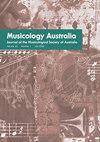The Political Orchestra: The Vienna and Berlin Philharmonics During the Third Reich
IF 0.4
0 MUSIC
引用次数: 0
Abstract
If Shakespeare was alive today he would probably have Hamlet tell Rosencrantz: ‘There is nothing either good or bad, but marketing makes it so’. This is relevant to some of the several themes of Dr Tr€umpi’s scholarly and sobering book, which is a cultural study as much as a musical one. They include political and ideological or nationalist concerns as well as those issues of sociological and musical salesmanship. The political and amoral rivalries of the two capital cities of those two bellicose nations are always part of the glowering historical sky, as well as their compliant orchestras which unedifyingly supported the politics and jealousies of those rival r egimes. Tr€umpi puts a little quote at the head of each chapter, and the one for Chapter 3 (‘Continuous Radicalization under Austrofascism and National Socialism’) seems to me to encapsulate the gestalt of his concerns well:政治管弦乐队:第三帝国时期的维也纳和柏林爱乐乐团
如果莎士比亚今天还活着,他可能会让哈姆雷特告诉罗森克兰茨:“世界上没有好坏之分,是市场使然。”这与Dr . trumpi这本学术性且发人深省的书中的几个主题有关,这本书既是对音乐的研究,也是对文化的研究。它们包括政治和意识形态或民族主义问题,以及那些社会学和音乐推销的问题。这两个好战国家的两个首都在政治上和道德上的竞争,以及它们顺从的管弦乐队,都是怒吼的历史天空的一部分,这些管弦乐队可耻地支持这些敌对政权的政治和嫉妒。Tr - umpi在每一章的开头都引用了一小段话,在我看来,第三章的那句话(“奥地利法西斯主义和国家社会主义下的持续激进化”)很好地概括了他所关注的完形:
本文章由计算机程序翻译,如有差异,请以英文原文为准。
求助全文
约1分钟内获得全文
求助全文

 求助内容:
求助内容: 应助结果提醒方式:
应助结果提醒方式:


